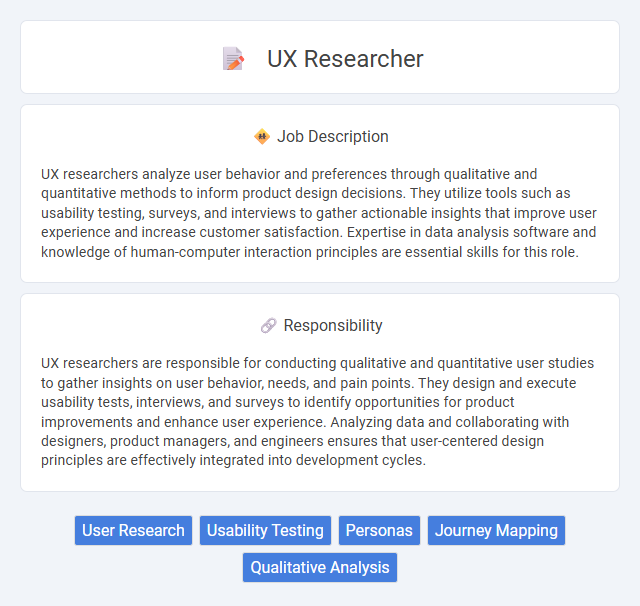
UX researchers analyze user behavior and preferences through qualitative and quantitative methods to inform product design decisions. They utilize tools such as usability testing, surveys, and interviews to gather actionable insights that improve user experience and increase customer satisfaction. Expertise in data analysis software and knowledge of human-computer interaction principles are essential skills for this role.
Individuals who are naturally curious, empathetic, and detail-oriented are likely to find UX researcher roles well-suited to their strengths. Those comfortable with analyzing human behavior, conducting interviews, and synthesizing qualitative data may have a higher probability of thriving in this position. However, people who prefer routine tasks or have little interest in user psychology may find this career less compatible with their skills and preferences.
Qualification
A UX researcher typically requires a bachelor's degree in psychology, human-computer interaction, or a related field, with advanced knowledge of research methodologies and data analysis tools such as SPSS, R, or Python. Expertise in qualitative and quantitative research methods, usability testing, and user behavior analysis is essential to creating user-centered design solutions. Strong communication skills and experience with design thinking frameworks enhance collaboration with cross-functional teams to improve product usability and user satisfaction.
Responsibility
UX researchers are responsible for conducting qualitative and quantitative user studies to gather insights on user behavior, needs, and pain points. They design and execute usability tests, interviews, and surveys to identify opportunities for product improvements and enhance user experience. Analyzing data and collaborating with designers, product managers, and engineers ensures that user-centered design principles are effectively integrated into development cycles.
Benefit
UX researcher roles likely offer significant benefits such as enhanced understanding of user behaviors and preferences, which can lead to improved product design and user satisfaction. These positions probably provide opportunities for collaboration across multidisciplinary teams, fostering professional growth and creativity. The role may also contribute to career advancement due to the rising demand for user-centered design in technology-driven industries.
Challenge
The UX researcher job likely involves navigating complex user behaviors and interpreting ambiguous data to uncover meaningful insights. Problem-solving skills may be tested frequently when designing studies that accurately reflect user needs and expectations. Adapting to rapidly changing technologies and diverse user groups probably presents ongoing challenges in delivering actionable research outcomes.
Career Advancement
UX researchers play a critical role in shaping user-friendly digital experiences by analyzing user behaviors, needs, and motivations through various research methodologies. Career advancement opportunities often include moving into senior researcher roles, UX research management, or transitioning into product management and user experience strategy positions. Gaining expertise in data analytics, user psychology, and cross-functional collaboration significantly enhances prospects for leadership and specialized roles within tech companies.
Key Terms
User Research
User researchers specialize in gathering and analyzing user behavior data to improve product design and functionality. They employ qualitative and quantitative research methods such as interviews, surveys, usability testing, and analytics to uncover user needs and pain points. Insights gained from user research directly inform UX strategy, ensuring products are intuitive, user-centered, and aligned with target audience expectations.
Usability Testing
A UX researcher specializing in usability testing designs and conducts experiments to evaluate how users interact with products, identifying pain points and areas for improvement. They utilize methods such as task analysis, user interviews, and heuristic evaluations to gather qualitative and quantitative data. The insights gained help optimize user interfaces, enhance user satisfaction, and drive product development decisions.
Personas
UX researchers use personas to represent target users, helping teams understand behaviors, needs, and goals through detailed archetypes derived from qualitative and quantitative data. Personas guide design decisions by providing context about user motivations, frustrations, and preferences, resulting in more user-centered products. Effective persona creation involves user interviews, surveys, and analytics to ensure accuracy and relevance in product development strategies.
Journey Mapping
UX researchers specializing in journey mapping analyze user interactions and experiences across multiple touchpoints to identify pain points and opportunities for improvement. By visualizing the end-to-end user journey, they provide actionable insights that guide design decisions and enhance overall user satisfaction. Their findings directly influence product development by aligning user needs with business goals and optimizing user engagement.
Qualitative Analysis
UX researchers specializing in qualitative analysis gather in-depth insights through methods such as user interviews, contextual inquiries, and usability testing to understand user behaviors, needs, and motivations. They analyze narrative data, identify patterns, and generate user personas and journey maps to inform design decisions and improve user experience. Expertise in coding qualitative data and leveraging tools like NVivo or Atlas.ti enhances the accuracy and reliability of research outcomes.
 kuljobs.com
kuljobs.com